Papers by Kirsten Leng

Gender and History, 2019
In her 2013 book Disturbing Practices, Laura Doan encouraged historians to take seriously the not... more In her 2013 book Disturbing Practices, Laura Doan encouraged historians to take seriously the notion of 'queerness-as-method,' as opposed to a form of being. 1 Treating 'queer' as a verb rather than a noun, she argued, would enable historians to think differently about the sexual past, and to write histories of sexuality less concerned with tracing genealogies for particular identities than subjecting the 'regime of modern sexuality' itself to critical examination. 2 According to Doan, practicing queerness-asmethod requires a rapprochement between historians of sexuality and queer studies scholars, that is to say, an ongoing mutual engagement across multidisciplinary lines, fields and methodologies. This sustained encounter, Doan maintained, will highlight 'the crucial importance of paying serious attention to the purpose of historicising as well as to the range of tools and methods at our disposal'. 3 For historians of sexuality, one of the gains Doan foresaw in deploying queerness as method is the ability to better understand 'how sexual difference is established, how it operates, [and] how and in what ways it constitutes subjects who see and act in the world '. 4 This article takes seriously Doan's call for greater exchange between history and Queer Studies; specifically, it considers what queer studies may have to offer one particular realm of the history of sexuality: the history of sexology. Within the historiography of sexology, 'queer' has occasionally appeared as sexology's object; only recently and exceptionally have scholars taken up queer studies as a source of insights and methods for understanding sexology, sexologists and their impacts. 5 Inspired by Doan's efforts to 'speculate on a praxis forged out of dialogical exchange between queer studies and academic history', this article engages the insights of one particular sub-field of Queer Studies, Queer Disability Studies, to analyse the long-overlooked work of women sexologists writing in Germany in the early twentieth century. 6 It will demonstrate that Queer Disability Studies provides scholars a way to situate women's sexology within broader tendencies of the field, read these women's ideas beyond the confines of German historiography and consider their legacy for broader twentieth-century thought regarding sexual liberation and sexual citizenship.
Journal of Women's History, 2013
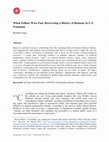
Based on archival research, scholarship from the emerging field of Feminist Humour Studies, and e... more Based on archival research, scholarship from the emerging field of Feminist Humour Studies, and engagements with feminist and poststructuralist theory, in this article I make the case for recovering a history of humour in feminism, with a focus on 20 th century US-based feminist practices. I argue that retrieving evidence of feminist humour-whether as political performance (street protests, "zaps") or cultural artefacts (comics, music, plays, polemical texts)-enables scholars to re-imagine feminism and its past, and opens up new ways of thinking about both. Using humour as a focal point through which to narrate feminist history allows for a recovery of neglected and marginalized voices from the feminist past. In so doing, humour facilitates a redrawing of the conceptual map that informs prevailing narratives about feminism and its history. Furthermore, engaging humour opens up new lines of inquiry for future researchers, including an investigation of how feminists' engagements with humour-and the new, subversive realities they engendered-helped shape feminist attitudes, subjectivities, and communities over the course of generations.
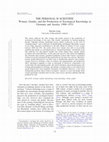
History of Psychology, 2015
This article addresses the roles women and gender played in the production of sexological knowled... more This article addresses the roles women and gender played in the production of sexological knowledge in the early 20th century, particularly in German-speaking Europe. Although existing scholarship focuses almost exclusively on the work of "founding fathers" such as Richard von Krafft-Ebing and Magnus Hirschfeld, women in fact made important contributions to the field. Based on analysis of texts written between 1900 and 1931, this article shows how women were able to successfully mobilize their gender as a privileged form of "situated knowledge," and thereby assert their authority over and superior insights into certain subject areas, namely, female sexualities and sexual difference. At the same time, however, this article also highlights the constraints upon women's gendered standpoint. It shows that women's sexological writing was not just informed by their gender but also by their class and race. Moreover, because gender threatened to cast their work as insufficiently objective and scientific, women cleaved to sexology's rules of evidence and argumentation, and adopted the field's ideological trappings in order to participate in discursive contestations over sexual truths. By interrogating gender, this article introduces much-needed nuance into existing understandings of sexology, and reframes sexology itself as a site wherein new sexual subjectivities were imagined, articulated, and debated. However, it also raises fundamental questions about women sexologists' capacity to create knowledge about women and female sexualities that was truer, more correct, and more authentic than that produced by men.
A Global History of Sexology, 1880-1950, 2017
JSTOR is a not-for-profit service that helps scholars, researchers, and students discover, use, a... more JSTOR is a not-for-profit service that helps scholars, researchers, and students discover, use, and build upon a wide range of content in a trusted digital archive. We use information technology and tools to increase productivity and facilitate new forms of scholarship. For more information about JSTOR, please contact support@jstor.org.
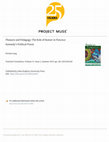
Feminist Formations, 2019
This article explores how pioneering Black feminist Florynce "Flo" Kennedy (1916-2000 deployed hu... more This article explores how pioneering Black feminist Florynce "Flo" Kennedy (1916-2000 deployed humor as a political tool, as well as the meaning and effects of her humor, both for herself and her audiences. Drawing upon a range of printed, recorded, and archival materials, this article argues that Kennedy's humor served to provide pleasure, to express her political ideas and remedies, and to educate diverse publics. Kennedy frequently stressed that politics was fun to her, and that it should be funindeed, that this sense of fun could be instrumental in inspiring new adherents to a cause, and could keep them committed by strengthening bonds of solidarity through laughter and song. However, Kennedy's words and actions were not merely funny and entertaining; in fact, they helped articulate and amplify her serious political insights. For Kennedy, humor served an important pedagogic purpose. Specifically, humor served as a framing device, that is, a way of recasting reality for varied publics. In addition to teasing out the meanings embedded in Kennedy's humor, this paper also assesses its impact using the limited, and admittedly problematic, sources available, including the news media.
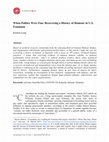
Synoptique: An Online Journal of Film and Moving Images, 2016
Based on archival research, scholarship from the emerging field of Feminist Humour Studies, and e... more Based on archival research, scholarship from the emerging field of Feminist Humour Studies, and engagements with feminist and poststructuralist theory, in this article I make the case for recovering a history of humour in feminism, with a focus on 20 th century US-based feminist practices. I argue that retrieving evidence of feminist humour-whether as political performance (street protests, "zaps") or cultural artefacts (comics, music, plays, polemical texts)-enables scholars to re-imagine feminism and its past, and opens up new ways of thinking about both. Using humour as a focal point through which to narrate feminist history allows for a recovery of neglected and marginalized voices from the feminist past. In so doing, humour facilitates a redrawing of the conceptual map that informs prevailing narratives about feminism and its history. Furthermore, engaging humour opens up new lines of inquiry for future researchers, including an investigation of how feminists' engagements with humour-and the new, subversive realities they engendered-helped shape feminist attitudes, subjectivities, and communities over the course of generations.
Journal of the History of Behavioural Sciences, 2014
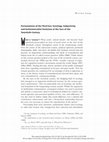
Signs: A Journal of Women in Culture and Society, 2014
W hat is "woman"? What could-indeed should-she become? Such questions preoccupied an array of soc... more W hat is "woman"? What could-indeed should-she become? Such questions preoccupied an array of social actors at the turn of the twentieth century throughout much of the modernizing world. Over the course of the nineteenth century, political upheaval, profound demographic shifts, and above all middle-class feminist activism had put pressure on hegemonic understandings and ideals of womanhood and helped incite the so-called woman question ðOffen 2000Þ. Public debate on the woman question peaked at the turn of the twentieth century, particularly between the 1880s and the 1910s-notably a period of expansion for organized women's movements around the world ðRupp 1997; Offen 2000Þ. During this time, diverse members of the public exchanged their ideas regarding womanhood in lectures and print media. That the woman question was constituted by an exchange of ideas is important to stress, as the diverse visions of womanhood put forward drew upon, and were rationalized by, existing knowledge.
After the History of Sexuality: German Geneaologies with and beyond Foucault, 2012
Journal of the History of Sexuality, 2016
lt r , D ff r n , nd x l Pr r n T rn f th nt r r p : lt r l th r n nd th r n L f r th Pr t t n f ... more lt r , D ff r n , nd x l Pr r n T rn f th nt r r p : lt r l th r n nd th r n L f r th Pr t t n f th r nd x l R f r , 0 -4 r t n L n J rn l f th H t r f x l t , V l 2 , N b r , J n r 20 6, pp. 62 82 ( rt l P bl h d b n v r t f T x Pr F r dd t n l nf r t n b t th rt l Access provided by UMass Amherst Libraries (
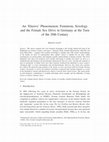
Centaurus, 2013
This article examines how four feminists belonging to the broadly defined left-wing of the Wilhel... more This article examines how four feminists belonging to the broadly defined left-wing of the Wilhelmine-era German women's movement-Henriette Fürth, Johanna Elberskirchen, Ruth Bré and Grete Meisel-Hess-engaged with scientific knowledge to redefine early 20th century understandings of the female sex drive. It contextualizes these authors' efforts to redefine the sex drive within contemporary sex reform politics and changing scientific understandings of human sexuality. The article illuminates how these four feminists used scientific knowledge to redefine the female sex drive as a simultaneously physiological and psychological phenomenon that was active, desiring and naturally in need of satisfaction. It further shows how these feminists mobilized this definition to assert women's 'biological right' to sexual emancipation and self-determination. However, this article also examines the conflicts this particular representation of the female sex drive provoked within the broader German women's movement, as well as the political restrictions it imposed upon feminist demands as a result of the biopolitical, racialist and heterosexist valences of fin-de-siècle sexual science. This article points up both feminists' contributions to scientific knowledge about sexuality and the difficulties of using science to advance feminist causes.
Book Reviews by Kirsten Leng
lh l R h, B l t b J . tr (r v r t n L n B ll t n f th H t r f d n , V l 0, N b r , F ll 20 6, pp.... more lh l R h, B l t b J . tr (r v r t n L n B ll t n f th H t r f d n , V l 0, N b r , F ll 20 6, pp. 6 6 (R v P bl h d b J hn H p n n v r t Pr D : F r dd t n l nf r t n b t th rt l


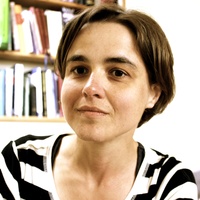

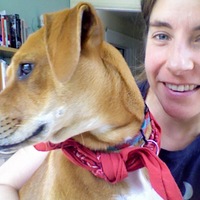


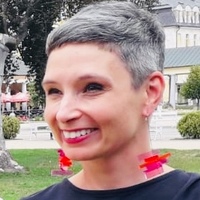

Uploads
Papers by Kirsten Leng
Book Reviews by Kirsten Leng